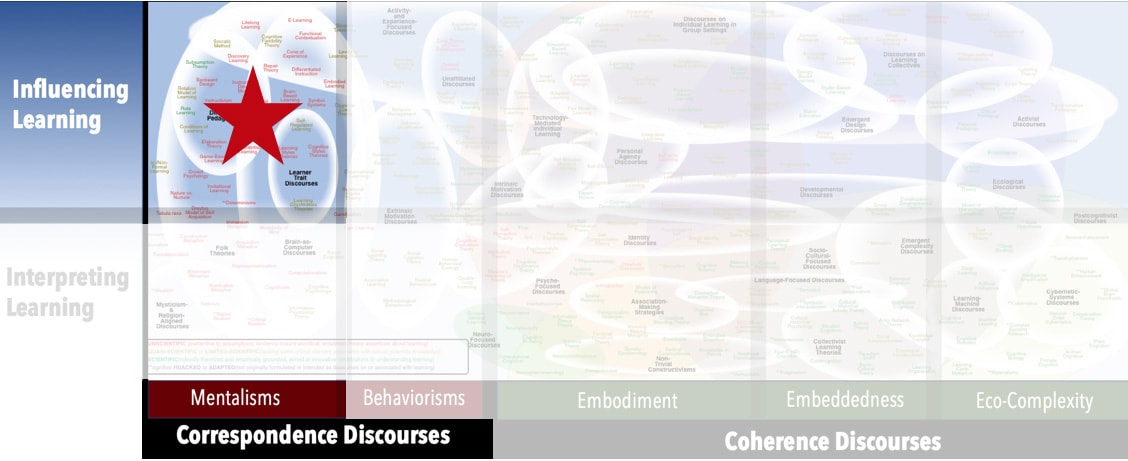AKA
Brain-Based Education
Brain-Based Teaching
Neurolism
Whole-Brain Teaching
Focus
Teaching practices based on popular interpretations of brain researchPrincipal Metaphors
- Knowledge is … object, commodity, goal, information
- Knowing is … mastery of knowledge
- Learner is … a brain-based accumulator (individual)
- Learning is … acquiring, discovering/uncovering, attaining, inputting
- Teaching is … delivering, facilitating, guiding, leading
Originated
1990sSynopsis
Proponents of Brain-Based Learning claim almost the same conceptual territory as Neuroeducation, with a somewhat more pragmatic emphasis. Brain-Based Learning aims to interrupt entrenched practices, conventions, and assumptions about the learning process by drawing scientific research into brain function and cognitive development, but its main focus in on school programs, lesson designs, and teaching methods. Typical emphases include:- Active Processing (Geoffrey Caine & Renate Caine, 1990s) – examining the form of and deriving meaning for new knowledge
- Orchestrated Immersion (Geoffrey Caine & Renate Caine, 1990s) – situating learners in a rich, deliberately structured learning environment
- Relaxed Alertness (Geoffrey Caine & Renate Caine, 1990s) – a state of minimized fear, prompted and nurtured by the teacher
- Brain Training (Brain Exercise) (various, 2010s) – rooted on the metaphor of “brain as muscle,” an umbrella term that includes all activities designed to “exercise” any aspect of brain function (e.g., memory, attention, processing speed). Currently, the most popular types of Brain Training come in the form of apps on portable devices – constituting a multibillion-dollar industry that is highly contested and lacking in robust evidence. Popular commercialized models include:
- Activate™ (B.E. Wexler & C8 Sciences Inc., 2010s) – commercial model of brain training based on eight core cognitive capacities: Sustained Attention; Response Inhibition; Processing Speed; Flexibility and Control; Simultaneous Attention; Working Memory; Category Formation; Pattern Recognition)
- Dual-Task Training (Neuromotor Exercise) – activities that combine physical exercise with complementary-but-demanding cognitive activities
- Mozart Effect – the claim that brain development in toddlers is improved if they are exposed to the music of Mozart prior to age three. In many versions of this unsubstantiated claim, the Mozart Effect is suggested to improve Spatial Reasoning.
- Neurolearning – a title deployed by multiple (apparently unrelated) commercial interests, all claiming a basis in Neuroscience, but none identifying a robust empirical basis. Specific applications include an test for dyslexia and an employee-development program.
- 10% Myth (Ten Percent Myth) (unclear origins and dates, but already prominent in the 1920s) – the popular and persistent belief that most humans use only 10% of their brains (often coupled to assertions that harnessing the remaining 90% will enable extraordinary powers. In fact, contemporary neuroimaging demonstrates that all the brain is active, all the time – even in sleep.
- Whole-Brain Child (Whole-Brain Parenting) (Daniel Siegel, Tina Payne Bryson, 2010s) – parenting advice on integrating a child’s logical (left) and emotional (right) brain, and their reactive (“downstairs”) and reasoning (“upstairs”) brain. The model is argued to promoted emotional regulation, resilience, and healthy brain development through connection, storytelling, and mindful parenting techniques.
Commentary
The strongest criticisms of Brain-Based Learning seem to be coming out of Neuroeducation. At their most extreme, the criticisms arrive in the form of accusations that Brain-Based Learning has a vested commercial interest in perpetuating neuromyths and peddling remedies. Such reproaches appear justified in the tendency in the Brain-Based Learning literature to offer narrow prescriptions, each founded on a singular insight (e.g., brain plasticity, consequences of stress, or role of physical exercise). Further, the vocabulary used in the Brain-Based Education literature to characterize learning, teaching, and education is scattered, inconsistent, and entirely uncritical – regularly invoking the Acquisition Metaphor, the Attainment Metaphor, Discovery Learning, and Cognitivism rather than notions more aligned with Neuroscience and its associated Embodiment Discourses.Authors and/or Prominent Influences
Diffuse, in part because the discourse is largely industry based.Status as a Theory of Learning
Brain-Based Learning is not a theory of learning.Status as a Theory of Teaching
Brain-Based Learning is explicitly a theory of teaching – or perhaps, as some critics frame it, a commercial industry of educational artefacts.Status as a Scientific Theory
Brain-Based Learning draws its orienting principles from Neuroscience and Cognitive Science – but, unlike Neuroeducation, it is not itself associated with a research program. That is, there is no effort to test its pedagogical advice, and so it cannot be described as scientific.Subdiscourses:
- Activate
- Active Processing
- Brain Training (Brain Exercise)
- Dual-Task Training (Neuromotor Exercise)
- Mozart Effect
- Neurolearning
- Orchestrated Immersion
- Relaxed Alertness
- 10% Myth (Ten Percent Myth)
- Whole-Brain Child (Whole-Brain Parenting)
Map Location

Please cite this article as:
Davis, B., & Francis, K. (2025). “Brain-Based Learning” in Discourses on Learning in Education. https://learningdiscourses.com.
⇦ Back to Map
⇦ Back to List
